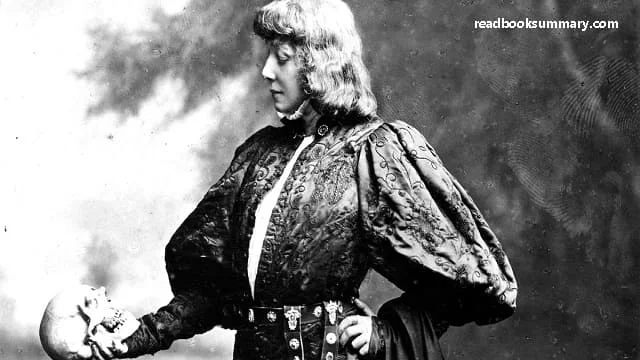Hamlet Play Summary, The Tragedy of Hamlet, Prince of Denmark, often shortened to Hamlet, is a tragedy written by William Shakespeare sometime between 1599 and 1601. It is Shakespeare's longest play, with 29,551 words.
Hamlet story Set in Denmark, the play depicts Prince Hamlet and his attempts to exact revenge against his uncle, Claudius, who has murdered Hamlet's father in order to seize his throne and marry Hamlet's mother.
 |
| Hamlet Summary |
Hamlet Summary
Act 1, Scene 1: One night at the Danish castle of Elsinore, a soldier named Barnardo relieves Francisco—a fellow soldier—from his watch duties. Another soldier, Marcellus, and a nobleman named Horatio also arrive, and the group talks about rumors of a ghost. Horatio is skeptical, but then the ghost appears wearing the clothes of the late King Hamlet. The ghost says nothing, but Horatio is sure its appearance is ominous. Because the ghost won’t speak to him, Horatio decides to fetch Prince Hamlet.
Act 1, Scene 2: Claudius—the late King Hamlet’s brother—holds court, having become king by marrying Gertrude, Prince Hamlet’s mother. He and Gertrude encourage Hamlet to stop mourning his father, insisting that death is natural and that it’s ill-advised to dwell too long on loss. When they exit, Horatio enters and informs Hamlet about the ghost of his father, and Hamlet plans to accompany him to the ramparts that night to see for himself.
Act 1, Scene 3: Laertes—the son of Claudius’s advisor, Polonius—prepares to leave for France. As he does so, he talks to his sister, Ophelia, about Hamlet, warning her not to get too close to him. Polonius enters and overhears some of this conversation. After Laertes departs, Polonius supports his son’s points about Hamlet, making Ophelia promise to stop spending time with the young prince.
Act 1, Scene 4: Hamlet goes to the ramparts with Horatio and Marcellus and encounters the ghost. He asks the ghost questions, but instead of answering them, the ghost encourages Hamlet to follow it. Horatio and Marcellus try to prevent Hamlet from going, but Hamlet defies them, insisting that he doesn’t value his life enough to care what happens to him.
Act 1, Scene 5: Having led Hamlet away from Horatio and Marcellus, the ghost confirms that he is the ghost of King Hamlet. He also tells Hamlet that his death wasn’t an accident—Claudius poisoned him. Having said this, the ghost asks Hamlet to avenge his death. Horatio and Marcellus catch up after the ghost disappears, and Hamlet makes them swear to keep silent about the ghost, adding that he might act strange in the coming days.
Act 2, Scene 1: In Elsinore, Polonius hatches a plan to spy on Laertes, wanting to know what kind of life his son is leading in France. After he puts this plan in motion, Ophelia enters and tells him that Hamlet burst into her room looking crazy. Assuming Hamlet is angry because Ophelia has spurned his advances, Polonius worries that he misled his daughter by telling her to avoid the prince.
Act 2, Scene 2: Claudius receives news that Fortinbras, the aggressive Prince of Norway, has been convinced to invade Poland instead of Denmark, though he wants permission to pass through Denmark on the way to war. Meanwhile, Hamlet’s old friends Rosencrantz and Guildenstern arrive to cheer him up, bringing with them a troupe of actors. Seeing an opportunity, Hamlet decides to have the actors stage a reenactment of his father’s murder so that he can gauge Claudius’s reaction.
Act 3, Scene 1: To gauge Hamlet’s mental state, Claudius and Polonius hide while Ophelia engages him in conversation. In this exchange, Hamlet goes back and forth about whether he ever truly loved Ophelia, confounding her and ranting about how she should flee to a convent because women like her tempt men into wickedness. Feeling that Hamlet is truly unwell, Claudius plans to send him to England so he won’t wreak havoc in Denmark.
Act 3, Scene 2: In a private conversation, Hamlet tells Horatio to watch Claudius during the play. If Claudius responds calmly to the theatrical depiction of King Hamlet’s murder, then perhaps he’s truly innocent. However, when the scene takes place, Claudius jumps up and storms away. Hamlet is certain this means Claudius is guilty. Meanwhile, Gertrude is deeply upset by Hamlet’s insensitivity, and Hamlet worries that he has been too cruel to his mother.
Act 3, Scene 3: Catching wind that Hamlet is on his way to Gertrude’s chamber, Polonius plans to hide and eavesdrop on their conversation. He thus leaves Claudius alone, at which point the king delivers a soliloquy in which he confesses to murdering his brother. He’s remorseful, but not so remorseful that he wants to genuinely atone for his sins. As he prays, Hamlet enters and considers killing him, but he ultimately decides to wait until Claudius sins again.
Act 3, Scene 4: Hamlet enters Gertrude’s room and has strong words for her. Gertrude becomes frightened and cries for help, and Polonius yells from his hiding place behind a tapestry. Startled, Hamlet stabs him, and then the ghost appears and urges Hamlet to hurry his quest for revenge. Gertrude thinks her son is crazy but agrees to keep quiet about what has happened. Hamlet says he must sneak away before he’s sent to England, where he suspects Claudius has arranged his execution.
Act 4, Scene 1: Gertrude tells Claudius that Hamlet is crazy and that he killed Polonius, so Claudius sends Rosencrantz and Guildenstern to find him and to locate Polonius’s body. Hamlet’s old friends catch up with him, but he refuses to reveal where he put Polonius’s body. He eventually runs off and tells them they’ll have to catch him.
Act 4, Scene 2: Rosencrantz and Guildenstern catch up with Hamlet, but he refuses to reveal where he put Polonius’s body. He eventually runs off and tells them they’ll have to catch him.
Act 4, Scene 3: Guildenstern and Rosencrantz catch up with Hamlet and bring him to Claudius, who asks where the prince has stashed Polonius’s body. After evading the question, Hamlet suggests that Polonius’s body is somewhere in the hall of the castle. Claudius, for his part, still plans to have Hamlet taken to England, and he privately notes (after Hamlet has been led out of the room) that he has instructed the King of England to execute Hamlet.
Act 4, Scene 4: Fortinbras arrives at Elsinore with his army and instructs his primary captain to tell Claudius that they are at his service while passing through Denmark on their way to conquer Poland. Hamlet then crosses paths with the captain, and when he realizes that Fortinbras has sent so many soldiers to conquer Poland (which is not viewed as all that valuable), he feels inspired once more to take action against his father’s murderer.
Act 4, Scene 5: In the aftermath of Polonius’s death, Ophelia has lost her mind with grief. She rants to Gertrude and Claudius about nonsensical matters, frequently referencing flowers. Shortly thereafter, Elsinore is overtaken as Laertes makes a bold entrance and accuses Claudius of killing Polonius, but Claudius insists that he’s innocent, even saying that he’ll gladly stand trial. Once he has cleared his name, Claudius says, he’ll help Laertes take revenge on his father’s true killer.
Act 4, Scene 6: Two sailors bring Horatio a letter from Hamlet, who has been at sea for two days. The letter informs Horatio that the ship Hamlet was on was overtaken by pirates, who took Hamlet hostage. In his letter, Hamlet tells Horatio to direct the two sailors to Claudius so that they can deliver a second letter to the king.
Act 4, Scene 7: After convincing Laertes that Hamlet killed Polonius, Claudius receives the prince’s letter, which informs him that Hamlet has returned to Denmark and wants to meet. With this in mind, Claudius and Laertes hatch a plan for Laertes to kill Hamlet in a fencing match using a poisoned rapier. Just then, Gertrude enters and informs them that Ophelia has drowned. Distraught, Laertes leaves to mourn his sister and prepare to kill Hamlet.
Act 5, Scene 1: Two gravediggers prepare Ophelia’s gravesite. Hamlet and Horatio encounter them and talk about death. As they talk, Laertes, Claudius, and Gertrude appear with a priest and Ophelia’s body. Seeing Laertes mourning Ophelia, Hamlet reveals himself and insists that he’s more upset than Laertes about Ophelia’s death. This leads to a brawl, though their fight is broken up, and Claudius privately tells Laertes to be patient in his desire to take revenge on Hamlet.
Act 5, Scene 2: Back in Elsinore, Hamlet accepts a challenge to fence Laertes. When the duel begins, he quickly lands several hits. Meanwhile, Gertrude accidentally drinks poisoned wine intended for Hamlet. Laertes hits Hamlet with the poisoned rapier but loses hold of the sword—Hamlet grabs it and cuts Laertes with it. As Laertes dies, he reveals that Claudius masterminded the plot to kill Hamlet, so Hamlet stabs the king. Everyone except Horatio dies, at which point Fortinbras appears and takes the throne.
You may also like to read: Twelfth Night Play Summary
 |
| Hamlet Synopsis |
 |
| Story of Hamlet |
 |
| Hamlet Plot Summary |
Questions about Hamlet Plot
What is a short summary of Hamlet? Hamlet Summary, The ghost of the King of Denmark tells his son Hamlet to avenge his murder by killing the new king, Hamlet's uncle. Hamlet feigns madness, contemplates life and death, and seeks revenge. His uncle, fearing for his life, also devises plots to kill Hamlet.
What is the main point of Hamlet? Hamlet, written by William Shakespeare around 1600, is a tragedy that explores themes of friendship, madness, and revenge.
Why is Hamlet a tragedy? Hamlet is tragedy because the want of poetic justice, for them and the hero, keeps it a painful mystery; and because the chain of cause and effect prevents it equally from being 'Absurd' drama, as does Hamlet's final acceptance of Providence at work in it to 'shape our ends'.
Did Hamlet love Ophelia? Hamlet reconfirms his sincere love for Ophelia at her death bed. He calls her “Fair Ophelia” (Act 5, scene 1, 228), implying he sees her as pure and virtuous. A real madness replaces a fake one. Hamlet proclaims that “forty thousand brothers could not with all their quantity of love make up my sum.
Is Hamlet Based on a true story? Hamlet is not a true story. It is a work of fiction inspired by the tale of the mediaeval Danish ruler, Amleth, from Gesta Danorum a 1200 AD history of Denmark by historian Saxo Grammaticus.
What type of character was Hamlet? Hamlet is melancholy, bitter, and cynical, full of hatred for his uncle's scheming and disgust for his mother's sexuality. A reflective and thoughtful young man who has studied at the University of Wittenberg, Hamlet is often indecisive and hesitant, but at other times prone to rash and impulsive acts.
How does Hamlet end? In Act 5 we see the tragic conclusion of the play – Hamlet accepts Laertes' challenge and is poisoned during the fight. Laertes, Claudius and Gertrude also all die. The only central character left alive at the end of the play is Horatio and Hamlet asks him, as he dies, to 'tell my story'.
Why is Hamlet so special? Hamlet remains one of Shakespeare's most famous plays because it taps into universal experiences that are not confined to one culture or time period. Audience members today can relate with Hamlet's struggles just as much as audience members from Shakespeare's time.
What is the best scene in Hamlet? Act 5 Scene 2 - The tragic climax, As they fight, Gertrude drinks the poisoned wine that Claudius had intended for Hamlet and dies.
Who is the tragic hero in Hamlet? Activity Overview. Hamlet is full of important literary elements for students to explore. One of these elements is the tragic hero, a protagonist who seems to be ill-fated, and destined for doom. In this play, Hamlet is the tragic hero as he leads himself and many others to their ruin and deaths.
Why Hamlet is a hero? Hamlet is a thoughtful young man whose determination to protect his own honor-to maintain his morality-becomes, for Shakespeare, the heroic social triumph of the play. Hamlet is Shakespeare's absolute hero. He is heroic even in the Greek sense: he is larger than life.
Is Hamlet a tragedy or revenge? revenge tragedy, Audiences watching Hamlet at the time it was first performed would recognize the play as belonging to a particular genre: they didn't have a name for it, but modern scholars call it “revenge tragedy.” In a revenge tragedy the hero has suffered a great wrong.
What is the conflict of Hamlet? Major ConflictHamlet feels a responsibility to avenge his father's murder by his uncle Claudius, but Claudius is now the king and thus well protected. Moreover, Hamlet struggles with his doubts about whether he can trust the ghost and whether killing Claudius is the appropriate thing to do.
Why did Shakespeare write Hamlet? Hamlet was written during a time of political uncertainty and fear, which has parallels in both the mood and the events of the play. The play was probably first performed in 1602, when Queen Elizabeth I was sixty-eight. She had no children, and it was unclear who would inherit her crown when she died.
Why did Hamlet reject Ophelia? Hamlet is cruel to Ophelia because he has transferred his anger at Gertrude's marriage to Claudius onto Ophelia. In fact, Hamlet's words suggest that he transfers his rage and disgust for his mother onto all women.
Did Hamlet marry Ophelia? Gertrude and Claudius marry very quickly after the king's death, and Claudius becomes the ruler. Hamlet is distraught and suspicious. He professes his undying love to Ophelia, and they are secretly married. Soon afterward, he tells Ophelia that he plans to murder Claudius.
Who is Hamlet in love with? Ophelia is Polonius' daughter and Laertes' sister. Hamlet has been in love with her for a while before the play starts and has given her several gifts during their courtship until her father warns her away from him and tells her not to see him anymore. During the play, he treats her very badly.
Did anyone survive Hamlet? First I listed out all the deaths in the play, noting that 9 of the 11 central characters die (in order, King Hamlet, Polonius, Ophelia, Rosencrantz, Guildenstern, Laertes, Gertrude, Claudius, and Prince Hamlet all die, while Horatio and Young Fortinbras do not).
How old is Hamlet in the play? Richard Burbage, the principal actor of Shakespeare's company, was likely around 32 when he played Hamlet, so the common assumption is that these lines are a specific reference to him, while in earlier versions (and in some of the suggested source material), Hamlet is a teenager, around 16.
Who was the best Hamlet? Laurence Olivier is often considered the finest actor of his generation. In 1948, the world was fortunate to witness him play the role he was born for (and direct himself). His Hamlet remains the only direct-Shakespeare adaptation to win the Academy Awards for Best Picture and for acting.
Who are the 3 main characters of Hamlet? Hamlet is the son of Gertrude and Old Hamlet. His father has just died and his uncle has become king. Ophelia is Polonius' daughter and Laertes' sister. She has been in a relationship with Hamlet.
